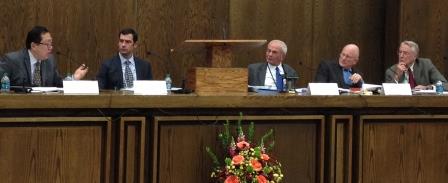





Joseph Hepworth, Brent Andrus, and Donlu Thayer reporting
This first plenary session of the 20th Annual International Law and Religion Symposium addressed "Religious and Philosophical Bases of Human Rights." The session opened with an introduction by Brett G. Scharffs, BYU Law School Associate Dean and International Center for Law and Religion Studies Associate Director, followed by welcomes from Law School Dean James R. Rasband and Brigham Young University President Cecil O. Samuelson. Guest moderator Zachary R. Calo, Professor of Law, Valparaiso University School of Law, superintended the session, which included presentations by David Little, Tore Lindholm, Asher Maoz, and Andrew Khoo.
David Little, Professor Emeritus, Harvard Divinity School; Research Fellow, Berkley Center for Religion, Peace & World Affairs, explained that, in a nutshell, his position regarding the justification of human rights is based on an effort to recover and rehabilitate the natrual rights tradition. His understanding of natural rights supports a notions of subjective rights not dependent upon religious belief, but certainly seeking to protect and accommodate it, and dependent upon an understanding of human nature as "rational, self-aware, and morally responsible." (Brian Tierney) Such an understanding also entails duties and oblivationa owed by individuals in respect to protecting the rights of others. Moral and legal rights are distinguishable. Legal rights are enforceable by physical sanctions, while moral rights are enforceable by verbal sanctions. The use of coercion cannot be justified to enforce beliefs. Professor Little suggests that human rights language, both moral and legal, rests upon a "two-tier justification": The first tier lays down a "natural" (secular) justification that holds people everywhere accountable and provides standards of protection to which everyone may appeal, regardless of religious or other identity. The second tier permits and secures a wide, highly pluralistic range of "extranatural" justifications and involve intimate, subjective experience in regard to solcial attachment, loyalty, identity, and sacred commitments, which must be tolerated without violence. The first tier protects, encourages, and is limited by the second tier, but it also contrains it in very important ways.
Tore Lindholm, Emeritus Professor, Norwegian Center for Human Rights, University of Oslo, is a philosopher and Lutheran. He began his remarks by noting that we live in a pluralistic world of religion and secularism. Belief includes systems of non-belief convictions that need to be protected as well as believers' systems of belief. The presence of religious and philosophical diversity is not disputed. Plurality has to be protected. We should look for grounds for human rights commitment that conflict with our own grounds. Professor Lindholm suggested three background assumptions:
1. The human right to religious freedom is inclusive of religious as well as non-religious belief, including humanists, agnostics, atheists and skeptics.
2. Modern applicable human rights are created to accommodate a diversity of faiths, practices, and organizations.
3. The modern basis of human rights are founded on post WW II codified norms and standards.
Human rights, especially the idea of human dignity should be understood as being grounded in both religion and philosophy, and even some of each. Diverse and conflicting grounds of universal human rights are legitimate. There is one common grounding for universal human rights, and that is "human dignity". But it should go even further: We should accept that there is a plurality of justifications which cannot be shared by all, but can be accepted as trustworthy across religious, philosophical and ideological divides.
Asher Maoz, Dean, Peres Academic Center Law School, Israel, began his remarks by noting that explaining the foundation of human rights in the Jewish tradition would take no time at all. No fundamental human rights are acknowledged by the Jewish tradition. Even the term "human rights" is absent in Jewish classic texts. By contrast, "sense of "duty" or "duty to God" governs Judaism. Thus there are duties to God, but not rights; human duties, but not human rights. This difference is best illustrated by comparing America's Bill of Rights which addresses human rights (We the People), to the Ten Commandments which addresses human duties (I am the Lord your God). This does not mean that human rights are ignored in Jewish law. For example, the right to life does not specifically exist in Jewish law, but it is inferred that there is a legal duty to protect the sanctity of human life. Likewise, there is not a Jewish right to education, but one is under duty to study, while the community is under duty to teach. We do not speak of rights in the strict sense, but rather generically. What it really means is privileges or liberties … being free to act as one pleases. So the focus is on the duty, not on the right. But the result is the same. Human dignity arises from the creation itself. This is reflected in the U.S. Declaration of Independence, that all men are created equal.
Andrew Khoo, Co-Chair, Human Rights Council, Malaysia, is an attorney and a member of a religious minority in Malaysia. He prefaced his remarks by observing we are all the product of our upbringing. Human rights are honored more in the breach in Malaysia. Islam has been used in Malaysia to justify discrimination against minority religions. Thus, Mr. Khoo has concluded that basing human rights in organized religion cannot be justified because of the way religion has been used. Organized religion as the basis for human rights is far too risky. Because it can be exclusionary and selective, it is not appropriate to base human rights on organized religion. Human rights easily be skewed and self-serving when a dominant religion interprets human rights to justify its superiority over other religion, which is what Islam has done in Malaysia. An artful application of the exceptions in UDHR has led to limiting the full range of fundamental rights and freedoms for minority groups under the guise of security, order and morality.
